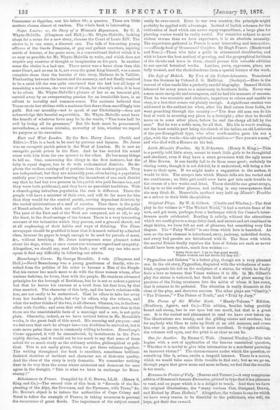Sisjer Louise; or, the Story of a Woman's Repentance. By
C. J. Whyte-Melville. (Chapman and Hall.)—Mr. Whyte-Melville, looking about for a scene for a new story, chooses the Court of Louis XIV. The choice is, in one sense, a discreet one. The talk of fire-eating young officers of the Garde Francaise, of gay and gallant courtier; aspiring maids of honour, et hoc genus omne, is a conventional dialect which it is as easy as possible for Mr. Whyte-Melville to write, and which does not require any exercise of thought or imagination on his part. In another sense the choice is a bad one. There never was B baser sham than this same Court, and no one in it, not even the great king himself, was a more complete sham than the heroine of this story, Madame de la TaMere. Fluctuating between the harem and the nunnery, and not finally resolved to be a saint till she was quite convinced that she had lost all hope of remaining a mistress, she was one of whom, for charity's sake, it is best to be silent. Mr. Whyte.Melville's picture of her RS an innocent girl, carried away by an overpowering passion for an irresistible hero, is an affront to morality and common-sense. The ancients believed that Venus smote her victims with a madness that drove them unwillingly into guilt. But our morality—not to speak of our Christianity—does not acknowledge this baneful superstition. Mr. Whyte-Melville must bare the benefit of whatever force may lie in the words, Vice loses half its evil by losing all its grossness." But his book must be pronounced, anvortheless, a serious mistake, unworthy of him, whether we regard its purpose or its execution.






































 Previous page
Previous page